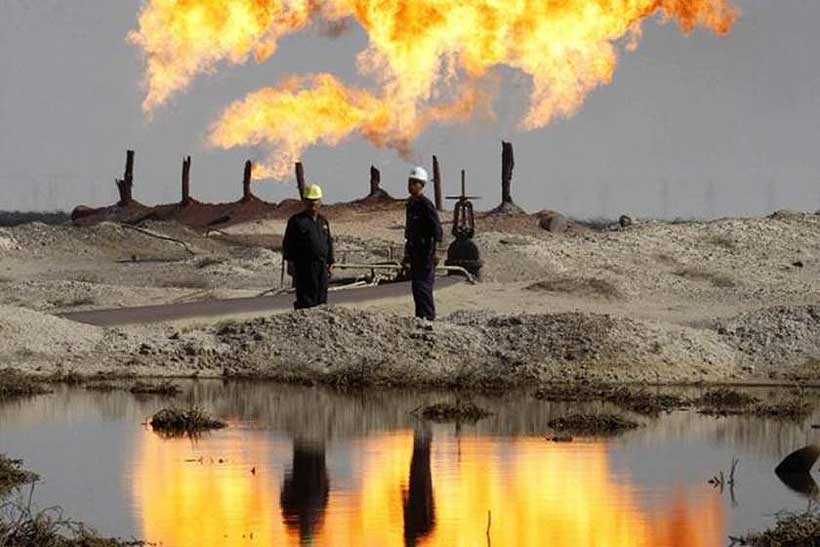is a semi autonomous government established in the northern provinces of Iraqi federal, with area of 40,643 sq.km and population of 5.1 million (2012 estimated).
KRI owns huge oil reserves (45 billion barrel of oil and about 6 trillion cubic meter of natural gas), that is about 1/3 of Iraq reserves and excessing what the Libya has. KRI is one of 10 richest areas around the world where it’s indicator of oil reserves per population is more than 8,800 barrels of oil, more than double of Iraq’s and even more than Saudi Arabia’s, hence the KRI was named by financial times as “an Ocean of reserves waiting to be tapped”.
KRI’s oil industry was boomed from 2007 to 2013, when the main infrastructures were established and production raised significantly. During this phase, the Ministry of Natural Resources (MNR) which is the main promoter of oil industry plans was establishedand the law of KRI oil industry was made, also Kurdistan’s transmitting pipeline to Turkish Ceyhan port (in mediterranean sea) was finished to enable Kurdistan Regional Government (KRG) to export it’s products to international markets. Kurdistan oil production was raised sharply to more than 500,000 barrels per day backed by those infrastructures and by KRG’s contracts with some big international oil companies.
Oil industry is engine of Kurdistan’s economy while it’s fast development between 2007 and 2013, made the the brightest growth period of Kurdistan’s economy, estimated about 8% to 10% annually. As per KRI’s economical conditions before beginning of it’s new oil industry era (lack of economical infrastructures, high level of unemployment…), Oil sector steering KRI’s economy practically while even it’s short pauses makes all the indicators returned back, quickly. Today, the most of universities in Kurdistan have oil engineering courses, as an indicator for showing oil importance for the region, while we couldn’t find even one course before 2007.
KRI’s crude oil in international market
KRG sells it’s crude oil directly to the international markets since 2014, when it’s share from federal budget was cut. The main customers of KRI’s crude oil are from EU and Russian companies. Regardless the type of selling contracts and pricing of KRI’s crude oil, it has been proven for international traders and they are paying for it in advanced, normally.
While the most of international traders bewared to purchase Kurdistan’s crude oil during 2014, because of Iraq’s warnings and legal claims, now many of famous traders are receiving it daily. Today, the most of customers makes long term contracts with KRG without complaints from Iraqi federal government, more.
The Kurdistan – Ceyhan oil pipeline could transit about 700,000 barrels of oil per day to international markets that could be developed to about 1,000,000 barrels per day to assure KRG’s ability to export produced crude oil.
The future of KRI’s oil sector
Substantially the Kurdistan’s reserves are not limited to the oil fields, but their is an ocean of natural gas that could supply huge amounts of customers demands especially for European countries, possibly via Turkish route. Reaching to oil production targets (2 million barrels that was planned for 2019) and exporting natural gas will enhance KRG and Iraq’s position in the international markets and improve Iraq’s bargaining power in OPEC, also could restart the paused oil projects which will take their crashed economy to the rail of growth.
Regarding the KRG’s targets for oil production, it should reach to 1 million barrels of oil per day till 2016 and 2 million barrels in 2019, the first target was not met yet and second is doubted to be achieved on time, as current production rate is about 350,000 bpd.
The share of KRI in Iraq’s oil production was about 20% before being affected in 2014 by ISIS war and economical crisis but this rate wasn’t reduced to less than 12% till October 2017 when Iraqi federal forces dominated the Kirkuk’s oil fields. Kirkuk’s crude oil was pumped to KRI’s oil pipes since 2014 which sustains amount of Kurdistan’s production around 600,000 barrels per day. During last 3 months (November 2017 to January 2018), the rate of oil production of KRI to Iraq is dropped to about 8%.
While some essential improvements in Kurdistan’s oil organizations and law were expected to be conducted after removing ISIS threats, clashes between KRG and Iraqi federal government on directing Kurdistan’s oil industry postponed them to another proper time. By these improvements, Kurdistan’s oil industry will be enabled to satisfy plans and targets as it is a critical industry for the future of region.
Despite all of above mentioned capacities and opportunities, the future of Kurdistan’s oil industry is unknown, it may be transferred from a global energy supplier to a resting reserves for decades, as was till 2007.


